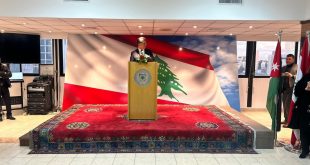Speaker Nabih Berri and President of Cyprus Nicos Anastasiades said Tuesday that both countries will cooperate on offshore oil and gas exploration in their respective maritime zones. During their meeting, Berri and Anastasiades also discussed collaboration between Lebanon and Cyprus on various local and regional issues.
“We discussed several matters related to the island [of Cyprus] and the security of the region,” Berri said. “In our discussion, we focused on the issue of oil and the economic zone for the sea and the oil wealth and what Israel is trying to extract from us or from our brothers in Cyprus. We agreed that this position is united and that we [will] work together.”
Anastasiades said the meeting was positive and highlighted the bond between the two countries.
“I am very pleased that we have reaffirmed our excellent relations and determination to strengthen these relations,” he said. “We look forward to finding new ways to strengthen cooperation between Cyprus and Lebanon.”
Anastasiades arrived in Beirut Sunday for a four-day official visit. He met Monday with President Michel Aoun, who called for increased cooperation between the two countries in the oil and gas sector.
Lebanon and Cyprus have been negotiating a unitization agreement – a revenue sharing plan for joint oil and gas fields – since 2013, according to political risk analyst with Middle East Strategic Perspectives Mona Sukkarieh. As yet, Lebanon has no confirmed oil and gas reserves and while Cyprus does have proven reserves, it remains unclear if there are any joint fields that extend between Lebanese and Cypriot territory. But Sukkarieh told The Daily Star that it is common for countries to agree a unitization agreement ahead of exploration, especially if prospects of a joint field are promising. “We don’t know at this point whether there are common reservoirs between Lebanon and Cyprus but it is common to have this agreed, even if it’s ahead of exploration, in order to clarify things from the start.”
The expert noted that the unitization agreement has been a primary issue of negotiation between Cyprus and both Israel and Lebanon for several years, though no agreement on this issue has been finalized with either country. A maritime border was agreed between Cyprus and Lebanon in 2007 but Lebanon’s Parliament has not ratified the deal.
Cyprus agreed its maritime borders with Israel in 2010, using the same southern border point referenced in the deal with Lebanon. But Sukkarieh explained that in the interim between the two border agreements, Lebanon had established a committee to define Lebanon’s exclusive economic zone; the southernmost point identified by this committee does not match that of the Cyprus-Israel maritime border agreement. “From a Lebanese perspective, this point [in the 2007 agreement with Cyprus] was not meant as official borders but simply as an interim solution until the question is settled between Lebanon and Israel,” Sukkarieh said.
Lebanon has since demanded the demarcation of the southern border with the help of the U.N. and other concerned parties. The disputed zone comprises of 870 square kilometers of water off Lebanon’s southern coast.
Turkey, meanwhile, has demanded that an agreement be reached over the divided island of Cyprus – the northeastern portion of which is a self-declared Turkish republic – before any maritime agreements can go ahead.
The disputed oil blocks and security issues were also topics of discussion in a meeting between Cypriot Foreign Minister Ioannis Kasoulidis and his Lebanese counterpart, Gebran Bassil. “We cannot stand and watch Lebanon under [the threat] of terrorism without taking action,” Kasoulidis said, in a joint news conference after the meeting.
Anastasiades has also met with Prime Minister Saad Hariri and Defense Minister Yaacoub Sarraf, among others, and will meet other officials before leaving Lebanon Wednesday.
 Lebanese Ministry of Information
Lebanese Ministry of Information



